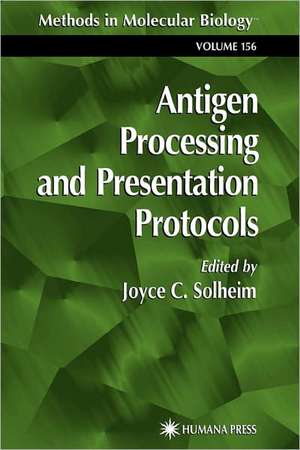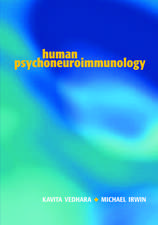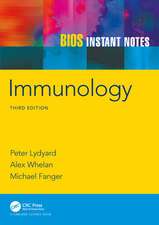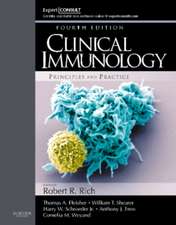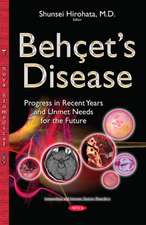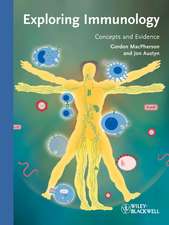Antigen Processing and Presentation Protocols: Methods in Molecular Biology, cartea 156
Editat de Joyce C. Solheimen Limba Engleză Paperback – 10 noi 2010
| Toate formatele și edițiile | Preț | Express |
|---|---|---|
| Paperback (1) | 716.28 lei 6-8 săpt. | |
| Humana Press Inc. – 10 noi 2010 | 716.28 lei 6-8 săpt. | |
| Hardback (1) | 723.57 lei 6-8 săpt. | |
| Humana Press Inc. – 15 sep 2000 | 723.57 lei 6-8 săpt. |
Din seria Methods in Molecular Biology
- 9%
 Preț: 791.59 lei
Preț: 791.59 lei - 23%
 Preț: 598.56 lei
Preț: 598.56 lei - 20%
 Preț: 882.95 lei
Preț: 882.95 lei -
 Preț: 252.04 lei
Preț: 252.04 lei - 5%
 Preț: 802.69 lei
Preț: 802.69 lei - 5%
 Preț: 729.61 lei
Preț: 729.61 lei - 5%
 Preț: 731.43 lei
Preț: 731.43 lei - 5%
 Preț: 741.30 lei
Preț: 741.30 lei - 5%
 Preț: 747.16 lei
Preț: 747.16 lei - 15%
 Preț: 663.45 lei
Preț: 663.45 lei - 18%
 Preț: 1025.34 lei
Preț: 1025.34 lei - 5%
 Preț: 734.57 lei
Preț: 734.57 lei - 18%
 Preț: 914.20 lei
Preț: 914.20 lei - 15%
 Preț: 664.61 lei
Preț: 664.61 lei - 15%
 Preț: 654.12 lei
Preț: 654.12 lei - 18%
 Preț: 1414.74 lei
Preț: 1414.74 lei - 5%
 Preț: 742.60 lei
Preț: 742.60 lei - 20%
 Preț: 821.63 lei
Preț: 821.63 lei - 18%
 Preț: 972.30 lei
Preț: 972.30 lei - 15%
 Preț: 660.49 lei
Preț: 660.49 lei - 5%
 Preț: 738.41 lei
Preț: 738.41 lei - 18%
 Preț: 984.92 lei
Preț: 984.92 lei - 5%
 Preț: 733.29 lei
Preț: 733.29 lei -
 Preț: 392.58 lei
Preț: 392.58 lei - 5%
 Preț: 746.26 lei
Preț: 746.26 lei - 18%
 Preț: 962.66 lei
Preț: 962.66 lei - 23%
 Preț: 860.21 lei
Preț: 860.21 lei - 15%
 Preț: 652.64 lei
Preț: 652.64 lei - 5%
 Preț: 1055.50 lei
Preț: 1055.50 lei - 23%
 Preț: 883.85 lei
Preț: 883.85 lei - 19%
 Preț: 491.88 lei
Preț: 491.88 lei - 5%
 Preț: 1038.84 lei
Preț: 1038.84 lei - 5%
 Preț: 524.15 lei
Preț: 524.15 lei - 18%
 Preț: 2122.34 lei
Preț: 2122.34 lei - 5%
 Preț: 1299.23 lei
Preț: 1299.23 lei - 5%
 Preț: 1339.10 lei
Preț: 1339.10 lei - 18%
 Preț: 1390.26 lei
Preț: 1390.26 lei - 18%
 Preț: 1395.63 lei
Preț: 1395.63 lei - 18%
 Preț: 1129.65 lei
Preț: 1129.65 lei - 18%
 Preț: 1408.26 lei
Preț: 1408.26 lei - 18%
 Preț: 1124.92 lei
Preț: 1124.92 lei - 18%
 Preț: 966.27 lei
Preț: 966.27 lei - 5%
 Preț: 1299.99 lei
Preț: 1299.99 lei - 5%
 Preț: 1108.51 lei
Preț: 1108.51 lei - 5%
 Preț: 983.72 lei
Preț: 983.72 lei - 5%
 Preț: 728.16 lei
Preț: 728.16 lei - 18%
 Preț: 1118.62 lei
Preț: 1118.62 lei - 18%
 Preț: 955.25 lei
Preț: 955.25 lei - 5%
 Preț: 1035.60 lei
Preț: 1035.60 lei - 18%
 Preț: 1400.35 lei
Preț: 1400.35 lei
Preț: 716.28 lei
Preț vechi: 753.97 lei
-5% Nou
Puncte Express: 1074
Preț estimativ în valută:
137.06€ • 143.10$ • 113.43£
137.06€ • 143.10$ • 113.43£
Carte tipărită la comandă
Livrare economică 04-18 aprilie
Preluare comenzi: 021 569.72.76
Specificații
ISBN-13: 9781617371660
ISBN-10: 1617371661
Pagini: 270
Ilustrații: IX, 270 p.
Dimensiuni: 152 x 229 x 17 mm
Greutate: 0.43 kg
Ediția:Softcover reprint of hardcover 1st ed. 2001
Editura: Humana Press Inc.
Colecția Humana
Seria Methods in Molecular Biology
Locul publicării:Totowa, NJ, United States
ISBN-10: 1617371661
Pagini: 270
Ilustrații: IX, 270 p.
Dimensiuni: 152 x 229 x 17 mm
Greutate: 0.43 kg
Ediția:Softcover reprint of hardcover 1st ed. 2001
Editura: Humana Press Inc.
Colecția Humana
Seria Methods in Molecular Biology
Locul publicării:Totowa, NJ, United States
Public țintă
Professional/practitionerCuprins
Purification of 20S Proteasomes.- Use of Proteasome Inhibitors to Examine Processing of Antigens for Major Histocompatibility Complex Class I Presentation.- Tracing the Route Taken by Peptides and Major Histocompatibility Complex Class I Molecules in Presentation of Exogenous Antigens.- Functional Analysis of Antigen Processing and Major Histocompatibility Complex Class II-Restricted Presentation.- Quantitation of Major Histocompatibility Complex Antigen Endocytosis Using Capture ELISA.- In Vitro Generation of Functional Human and Murine Dendritic Cells.- Genetic Engineering of Dendritic Cells Using Retrovirus-Based Gene Transfer Techniques.- Use of Vaccinia Virus Expression Vectors to Investigate Antigen Processing and Presentation.- Sindbis Virus-Based Vectors for the Study of Class I Antigen Presentation In Vitro and In Vivo.- Precision Genotyping of Human Leukocyte Antigen-A, -B and -C Loci Via Direct DNA Sequencing.- Photolabeling the Transporter Associated with Antigen Processing.- Application of One-Dimensional Isoelectric Focusing to Separate Different Major Histocompatibility Complex Class I Alleles and Determine Their Allelic Interactions with Transporter Associated with Antigen Processing (TAP).- Analysis of Major Histocompatibility Complex Class I Interactions with Endoplasmic Reticulum Proteins.- Methods of Purification of Heat Shock Protein-Peptide Complexes for Use as Vaccines Against Cancers and Infectious Diseases.- Random Peptide Libraries.- Neural Network Method for Predicting Peptides that Bind Major Histocompatibility Complex Molecules.- Analysis of T-Cell Response Using Altered Peptide Ligands.- Assays of Thymic Selection Fetal Thymus Organ Culture and In Vitro Thymocyte Dulling Assay.- Protocol for Diversion of a CD4+Response to theT-Helper 2 CellPathway.- Quantitating Presentation of MHC Class I-Restricted Antigens.- Identification of CD8+T-Cell-Stimulating Antigen Genes in cDNA Libraries.- Generation of Antigen-Specific, LacZ-Inducible T-Cell Hybrids.
Textul de pe ultima copertă
The processing and presentation of antigens by major histocompatibility complex (MHC) molecules is a crucial immunological phenomenon in infectious disease, malignancy, autoimmune disease, and transplantation. In Antigen Processing and Presentation Protocols, well-recognized and innovative experimentalists detail their cutting-edge methods for studying this complex process. Drawing on expertise from biochemistry, cell biology, and immunology, they describe step-by-step methods designed to question how MHC-binding peptides are generated, to test how peptides are delivered to MHC molecules, to analyze MHC peptide-binding patterns, and to assay the T cell response to the MHC/peptide complex. Each method is presented in sufficient detail to be readily reproducible and includes notes about potential pitfalls and tips on how to avoid failures. Emphasis is given those technical steps critical for experimental success that are often omitted from methods published in the primary literature.
Eminently accessible and state-of-the-art, Antigen Processing and Presentation Protocols provides both new and experienced investigators with highly practical tools that will extend the questions that can be asked, and effectively be answered, concerning antigen processing/presentation.
Eminently accessible and state-of-the-art, Antigen Processing and Presentation Protocols provides both new and experienced investigators with highly practical tools that will extend the questions that can be asked, and effectively be answered, concerning antigen processing/presentation.
Caracteristici
Includes supplementary material: sn.pub/extras
